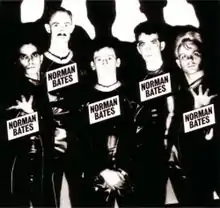Landscape (band)
Landscape was an English synthpop band, best known for the 1981 hits "Einstein a Go-Go" and "Norman Bates". Formed in London in 1974, the band toured constantly during the mid-to-late-1970s, playing rock, punk and jazz venues and releasing two instrumental EPs on its own Event Horizon label. The group began experimenting with computer-programmed music and electronic drums in the late 1970s and early 1980s, making records in the emerging genre of synthpop.
Landscape | |
|---|---|
 | |
| Background information | |
| Origin | United Kingdom |
| Genres | |
| Years active | 1974–1983 |
| Labels |
|
| Past members | Richard James Burgess Christopher Heaton Andy Pask Peter Thoms John Walters |
Formation
Landscape comprised Richard James Burgess (vocals, drums), Christopher Heaton (keyboards), Andy Pask (bass), Peter Thoms (trombone, keyboards), and John Walters (keyboards, woodwinds). The band built a following through live performances and touring before releasing their debut album Landscape in 1980. Their next album in 1981, From the Tea-Rooms of Mars...to the Hell-Holes of Uranus led to the Top 5 UK hit "Einstein a Go-Go". Their third album in 1982, Manhattan Boogie-Woogie was well received as a dance album. After release of this album, Heaton and Thoms left the band.[2]
Landscape III
Following the release of Landscape's third and final album, Manhattan Boogie-Woogie, the band became a trio, composed of Burgess, Pask, and Walters. Renaming the band Landscape III, the members went on to release the singles "So Good, So Pure, So Kind" and "You Know How to Hurt Me".[3] The trio broke up in 1984 and band members went on to separate careers.
Subsequent careers
Burgess[4] and Walters went on to careers in music production. Walters also co-founded Unknown Public in 1992 and works as a writer and editor.[5] Pask worked as a sessions player and co-wrote the theme music for the long-running British ITV series The Bill.[6] Thoms later appeared on Thomas Dolby's 1984 album The Flat Earth and toured with Dolby that year playing trombone. He also served as a member of staff at the Musicians' Union's head office in Britain.[7]
Discography
Studio albums
| Year | Album | UK | Label |
|---|---|---|---|
| 1979 | Landscape | – | RCA |
| 1981 | From the Tea-rooms of Mars .... | 13 | RCA |
| 1982 | Manhattan Boogie-Woogie | – | RCA |
Singles
| Year | Single | UK |
|---|---|---|
| 1979 | "Japan" | – |
| 1979 | "Sonja Henie" | – |
| 1980 | "European Man" | – |
| 1981 | "Einstein a Go-Go" | 5 |
| 1981 | "Norman Bates" | 40 |
| 1981 | "European Man" (reissue) | – |
| 1982 | "It's Not My Real Name" | – |
| 1982 | "Eastern Girls" | – |
| 1983 | "So Good, So Pure, So Kind" as 'Landscape III' | – |
| 1983 | "You Know How to Hurt Me" as 'Landscape III' | – |
EPs
- "U2XME1X2MUCH" / "Don't Gimme No Rebop" / "Sixteen" (1977) 33⅓ rpm 7" *
- "Workers Playtime" / "Nearly Normal" / "Too Many Questions (Don't Ask Me Why)" (1978) 33⅓ rpm 7"
* "U2XME1X2MUCH" is short for "You two-timed me one time too much"
Both EPs were issued on Landscape's own Event Horizon label.
Radio session tracks
- "Kaptin Whorlix"
- "Gotham City"
- "Lost in the Small Ads"
- "Workers' Playtime"
Recorded for an April 1978 Peel Session.[9]
References
- Harris, Alan (22 October 2014). "Rise and fall of band that was King in the Eighties". Coventry Telegraph.
- Huey, Steve. "Landscape". AllMusic. Retrieved 9 December 2015.
- "Landscape". Retrieved 9 December 2015.
- "Richard James Burgess Discography". discogs. Retrieved 8 October 2011.
- Heller, Steven (18 July 2006). "Eye in Focus: An interview with John Walters". Retrieved 9 December 2015.
- "Andy Pask on Session Work: Tips and Advice". 6 December 2012. Archived from the original on 14 March 2013. Retrieved 9 December 2015.
- "The Musician". Spring 2015. Archived from the original on 13 September 2015. Retrieved 9 December 2015.
- Roberts, David (2006). British Hit Singles & Albums (19th ed.). London: Guinness World Records Limited. p. 312. ISBN 1-904994-10-5.
- BBC John Peel Sessions – Landscape. Retrieved 19 August 2006.